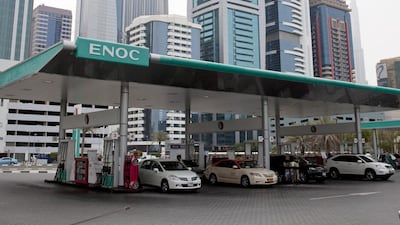Drivers of about 120,000 commercial vehicles will be paying for fuel at Emirates National Oil Company filling stations through wireless technology – without the need for cash or cards – from the end of the year.
The technology, which uses a microchip mounted above each vehicle’s fuel tank inlet, will make life easier for the company’s 3,200 commercial and government customers, as well as helping to ease queues at pumps, said Burhan Al Hashemi, the managing director of Enoc Retail.
Since the initiative was launched in January, 10,000 vehicles have been installed with the radio frequency identification-based system.
“The remarkable response from our customers underlines their acceptance of our new initiative and encourages us to continue to innovate,” said Mr Al Hashemi.
Enoc staff have been installing microchips in around 100 vehicles per day, either at the customer’s premises or Enoc filling stations. Once fitted, drivers can then fill the vehicles with fuel without the use of cards or cash. Every time the vehicle refuels at one of Enoc’s stations, an antenna attached to the microchip communicates through radio waves with technology inserted in the nozzle of the pump. Information is transmitted back to a server in Enoc’s head office to log details about the refuelling, such as the price as well as the time, date and location, on the customers’ account.
Until now, Enoc’s commercial customers used special cards to pay for fuel. The company plans to phase out the use of the cards by the end of the year, replacing them with the Vehicle Identification Pass (ViP) system.
Enoc has been seeking to boost its revenues from non-fuel business as it struggles with the cost of subsidising fuel for consumers. Federal legislation mandates that Enoc, which is owned by the Dubai Government, and its subsidiary Emirates Petroleum Products Company (Eppco), sell petrol at subsidised prices.
Customers say the system saves them on time and administration.
“ViP is easy to use, saves time, draws on advanced technology, limits misuse of fuel cards and minimises the use of paperwork, in addition to providing updated reports,” said Essam Elghussein, the finance manager of Dubai International School.
Dubai Police is among the government customers introducing the new technology. More than 3,000 vehicles will be converted this year, said Mubarak Saeed Al Ameri, head of the vehicle and spare parts purchase section at Dubai Police.
“We’ve been testing this technology and it saves time,” he said. “Sometimes with the cards there could be a problem if the staff lost a card or it is damaged,” he said.
Enoc is using technology provided by Turpak, a Turkish company which has been advancing the use of automation at fuel stations in that country for the past 15 years.
Mr Al Hashemi said there were no plans at the moment to allow other motorists to use the technology. But he said the system could be integrated with any similar future technology offered by Enoc’s competitors.
Drivers in Dubai frequently complain about lengthy queues at fuel stations.
Mr Al Hashemi said along with the new technology, Enoc was taking other action to help minimise waiting times.
“There are two ways of avoiding long queues,” he said. “One way is to build more stations. We are also introducing longer hoses at 30 stations with the highest congestion so they can fill from both sides [of the pump].”
It plans to open another two fuel stations in Dubai before the end of this year and is considering adding a further seven to 10 stations.
tarnold@thenational.ae
Follow us on Twitter @Ind_Insights

